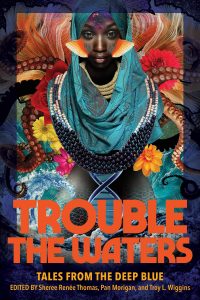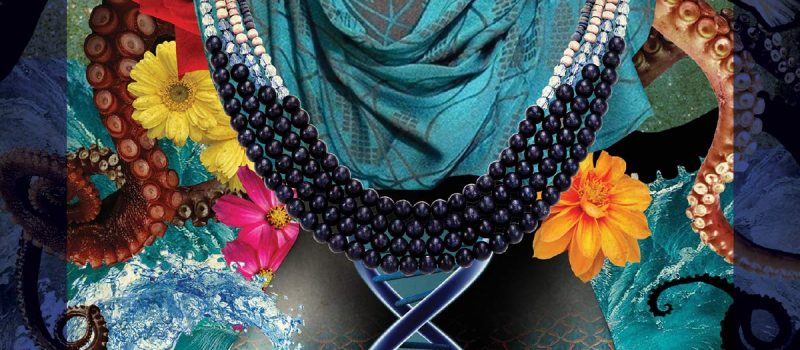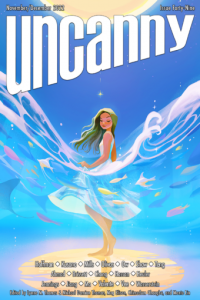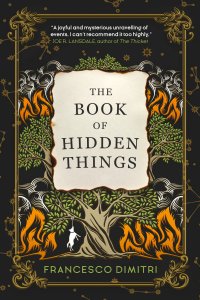Alex Brown Reviews Trouble the Waters by Sheree Renée Thomas, Pan Morigan, & Troy L. Wiggins, eds.
 Trouble the Waters, Sheree Renée Thomas, Pan Morigan & Troy L. Wiggins, eds. (Rosarium 978-0-99870-596-5, $19.95, 300pp, tp) November 2020. (Third Man Books 978-1-73484-227-2, $17.95, 404pp, tp) January 2022.
Trouble the Waters, Sheree Renée Thomas, Pan Morigan & Troy L. Wiggins, eds. (Rosarium 978-0-99870-596-5, $19.95, 300pp, tp) November 2020. (Third Man Books 978-1-73484-227-2, $17.95, 404pp, tp) January 2022.
In Trouble the Waters: Tales from the Deep Blue, editors Sheree Renée Thomas, Pan Morigan & Troy L. Wiggins pull together 33 stories and poems from a staggering array of creative voices. Longtime readers of short speculative fiction will instantly recognize Thomas, who has edited several phenomenal anthologies, and Wiggins, who is the publisher of Fiyah. Both have also written extensively in fiction and nonfiction. Other authors like Maurice Broaddus, adrienne maree brown, Christopher Caldwell, Andrea Hairston, Kate Heartfield, Nalo Hopkinson, Danian Darrell Jerry, Ama Patterson, Betsy Phillips, Henry Szabranski, and Marie Vibbert have all crossed my path over the years in speculative fiction magazines and other anthologies.
I was unfamiliar with Morigan coming into this. Her background in music and poetry makes her a welcome addition, and she was not the only new writer I encountered. I admit that despite reading fairly widely in the short speculative fiction realm, many were brand new to me, including Maria Osunbimpe, Hamilton Abegunde, Nanna Áradóttir, Story Boyle, Jaquira Díaz, Rylee Edgar, Lyndsay E. Gilbert, Jamey Hatley, Mateo Hinojosa, Elle L. Littlefield, Gina McGuire, Naila Moreira, Susana Morris, Cecilia Quirk, Shawn Scarber, Rion Amilcar Scott, and Jasmine Wade. I also read very little poetry, so I greatly appreciated the chance to read poems from Linda D. Addison, Jacqueline Johnson, and Heather ‘Byrd’ Roberts. There were a few reprints, but most of the works were original to the anthology.
Although the stories within this anthology are not exclusively representative of the African American or Black diaspora, it’s worth noting our influence on the title. ‘‘Trouble the water’’ is a piece of the phrase ‘‘God’s gonna trouble the waters,’’ a line from the old slave song and later a popular Civil Rights anthem ‘‘Wade in the Water’’. At first, it sounds like a simple song. We’re in dark times, but God’s blessings are coming. It has a steady beat and easy lyrics, good for working to. However, it was also believed to have been used in the Underground Railroad. Enslaved Africans taking their freedom used whatever tools they had at their disposal to guide their journey, whether it be by braiding maps in their hair or using songs as trail markers. ‘‘Wade in the Water’’ may have been used by guides like Harriet Tubman to warn freedom seekers to get in the water to hide their tracks.
Much like the title, the anthology’s theme of ‘‘water’’ takes on many different meanings. Initially it sounded too simple, but with each story and poem, a new layer is added. Each entry is different from the rest yet united by a common theme, sometimes a hard interpretation and other times an extremely loose interpretation. From to sea monsters to mermaids, from canals to rivers to oceans, from eco-justice to the Middle Passage and Transatlantic slave trade, from myths to legends to folktales and beyond. The anthology is as ever changing as water itself, or as Thomas puts it in her introduction, ‘‘evoking water in its myriad moods and modes.’’
I could easily write about each and every entry here, but for brevity’s sake I’ll focus on a few favorites. I couldn’t stop thinking about the unsettling story by Nanna Áradóttir, ‘‘Salt Baby’’. Desperate for a child, a couple create one out of salt, but tragedy strikes again and again. In ‘‘Dance of Myal’’ by Maurice Broaddus, our narrator has a ‘‘Broken mind. Broken heart. Broken spirit. Broken self.’’ The narrator, Faren, encounters the River Mumma, a water creature similar to the Mami Wata, and things take a turn, for the worse or the better you must judge for yourself. adrienne maree brown’s ‘‘Call the Water’’ is as creative as its narrative style. Written entirely in lowercase and with no indents at the beginning of each paragraph, it centers on two women from Detroit, Sinti and her grandmother Maria, as the city struggles to access clean water. Nalo Hopkinson’s story ‘‘Whimper’’ is about a young woman who jumps into a river to hide with a group of others from the monsters chasing them. It is one of the shorter in the collection, but no less evocative or layered.
Trouble the Waters functions well on an individual story level and as a collective work, with its wide range of voices, identities, experiences, traditions, and styles, all united under specific yet open-ended themes. With so much diversity on display, every reader will find at least one story they love in this excellent collection. Speculative fiction fans looking to broaden their literary horizons and add new authors to their list of favorites would do well to pick up Trouble the Waters. It is a strong anthology from a trio of talented editors.
Alex Brown is a queer Black librarian and writer. They have written two books on the history of Napa County, California’s marginalized communities. They write about adult and young adult science fiction, fantasy, and horror as well as BIPOC history and librarianship. Diversity, equity, inclusion, and access set the foundation of all their work. Alex lives in Southern California with their pet rats and ever-increasing piles of books.
This review and more like it in the March 2022 issue of Locus.
 While you are here, please take a moment to support Locus with a one-time or recurring donation. We rely on reader donations to keep the magazine and site going, and would like to keep the site paywall free, but WE NEED YOUR FINANCIAL SUPPORT to continue quality coverage of the science fiction and fantasy field.
While you are here, please take a moment to support Locus with a one-time or recurring donation. We rely on reader donations to keep the magazine and site going, and would like to keep the site paywall free, but WE NEED YOUR FINANCIAL SUPPORT to continue quality coverage of the science fiction and fantasy field.
©Locus Magazine. Copyrighted material may not be republished without permission of LSFF.








